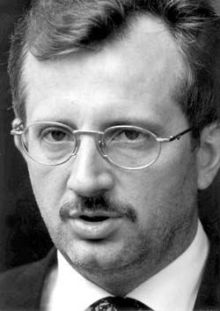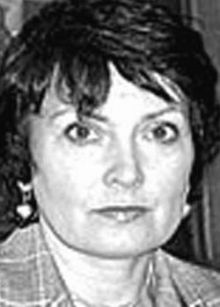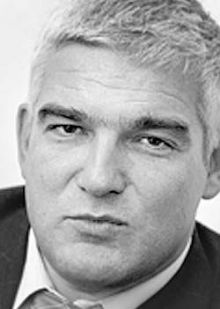A new government in Ukraine has finally been formed, headed by Yulia Tymoshenko, the former prime minister. How do the East and West estimate the longevity of the Orange team, which has effectively staged a comeback? What impact can the team’s return to power have on Ukraine’s European integration and its relations with its huge northern neighbor-the Russian Federation? What do Brussels and Moscow anticipate from the new prime minister? Below are comments from Western and Russian experts.
Marek SIWIEC, Vice President of the European Parliament:
“First of all, it is a good thing that the new government was formed this year. It is true that six months is more than enough time to form a government. However, it must be noted that a change of government and the forging of a coalition are not a simple process. Now there is a coalition that was built by Ms. Tymoshenko. It is very fragile, but then Konrad Adenauer had exactly the same majority in 1948, yet he was the chancellor of Germany for the next 20 years.
“Everyone knows the new Ukrainian prime minister very well. There are people who support her and those who don’t. We need to wait and see what Tymoshenko’s priorities are. So far I don’t know what they are. However, I know most of the people who obtained the main posts in the government. From the European perspective, it is important that Hryhorii Nemyria is one of the deputy ministers and will coordinate European integration. I think this is a good decision. Nemyria knows the current issues and theory, but this is his first important position in the government. I believe that he will be well accepted in Brussels. Another good choice is Volodymyr Ohryzko, who is an experienced diplomat. I believe that the two of them-the enthusiastic Nemyria and the professional diplomat Ohryzko-will make a good team for advancing Ukraine’s European aspirations.
“As for Tymoshenko herself, judging by her election campaign declarations, I hope that she will accelerate Ukraine’s integration into the EU. We are anticipating that there will be a new impulse and new dynamics in these processes. From the political standpoint it is very important that Yurii Lutsenko, the leader of a pro-presidential party, is also in the government, as well as Oleksandr Turchynov and Yurii Yekhanurov.
“I believe that Brussels’ reaction to the new government will be positive. Everyone was waiting for the new government to be formed, and now they see that it includes people who are well-known in Brussels. I think that the EU will send sincere congratulations and declare its willingness to cooperate with the new partners.”
Tamara GUZENKOVA, professor of history and chief research associate at the Russian Institute for Strategic Studies (RISD):
“The formation of a new government in Ukraine sparked intensified interest. We were all watching to see how this stage of the political confrontation would end. There were few people here who doubted that Tymoshenko would win, albeit with a minimum majority, and hold the prime ministership for a certain time.
“I wouldn’t say that the Russian establishment and expert community have any especially alarming expectations or apprehensions on this account. However, many experts in Russia say that a warming in relations or the resolution of any serious conflicts is unlikely. Above all, we are paying attention to her threats, and we see that her speech to parliament prior to the vote was rather aggressive and filled with various threats directed at her political opponents. What we heard concerning Russia was, on the other hand, softened rhetoric with a certain degree of compromise. It is eminently obvious that the new prime minister is categorical in her promises to destroy RosUkrEnergo, the so-called intermediary gas-transporting structure in Ukraine-Russia relations. Many people expect that one of the first steps in relations with Russia will be attempts to address gas and energy issues. This is a top-priority task, both from the standpoint of vital necessity and establishing one’s authority and earning points. An attack will be made on Russia’s Gazprom in order to change the price calculation formula to reduce prices. I think that Tymoshenko’s new government and the financial and entrepreneurial groups that are close to her will employ powerful intellectual and lobbying resources.
“I don’t expect any serious breakthrough decisions in this area or considerable concessions from Russia and Gazprom. The system of relations is unlikely to be constructed in such a way as to give the new government certain privileges or preferences.
“I believe that the energy agenda will be a constant point of discussion and negotiation for the entire heating season until the spring of 2008. I think that Tymoshenko will gradually build a more or less acceptable dialog with the Russian leadership. It seems that the system of power relations that is being formed in Russia, and especially in recent days, bears an intrinsic resemblance to the principles and ideology espoused by Tymoshenko. She favors iron-handed rule, especially if it’s her hand that is ruling. She also prefers strict executive discipline. There are certain intentions here that may link Russia and Ukraine in this respect. I don’t think that the Kremlin and the Russian leadership will immediately open the doors to welcome Tymoshenko into all offices.
“In my opinion, for the time being we will have a period of accommodation and rearrangement of relations with Tymoshenko. Viktor Yanukovych represents a different system of values and relations with the East and the West. Perhaps Tymoshenko will find a common language to speak with the West much faster than with the East. She has a very Europe-oriented circle of administrators, including foreign affairs officials.”
Andrii RIABOV, member of the Expert Council at the Moscow Carnegie Center:
“It seems to me that the election of the new government is not a turning point, as it will be followed by the presidential elections in 2009. Many things will obviously happen before then. I don’t rule out that this government may resign because it is very unstable. It is difficult to say what backstage arrangements will be made along the way by the three leading forces. I believe that Tymoshenko has a 50-50 chance of strengthening her leadership. On the other hand, various Ukrainian elites are apprehensive. I think the chances are equal: either she will succeed in convincing them that she is the most influential player now, or they will give way to their fears, in which case some new turns and political combinations are possible.
“As far as our future relations are concerned, the situation is, again, ambiguous and uncertain. On the one hand, there is hard-line rhetoric and a bid to emphasize that a change is needed in the relations between our two countries and Ukraine needs to follow a harder line in its policy. On the other hand, it is believed that if the new prime minister becomes actively involved in some intergovernmental projects, the situation may change. Of course, in Russia there are many uncertainties as to the configuration of the future government- despite recent resolutions. Who will form partnerships, who will come to power, and with what interests, after the presidential elections in Russia-all this is beyond our knowledge and understanding.
“That is why I would say that our bilateral relations have reached another crossroads after which there are various options. No one can say who will be Tymoshenko’s real partner on the Russian side.”










